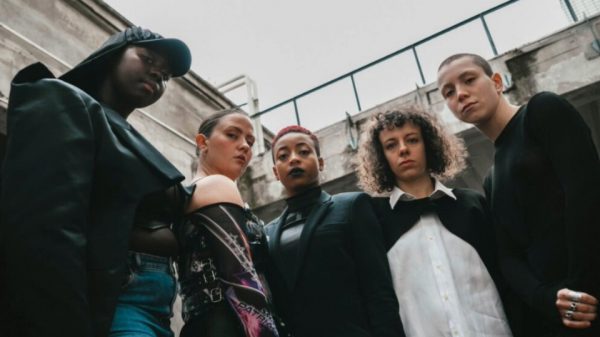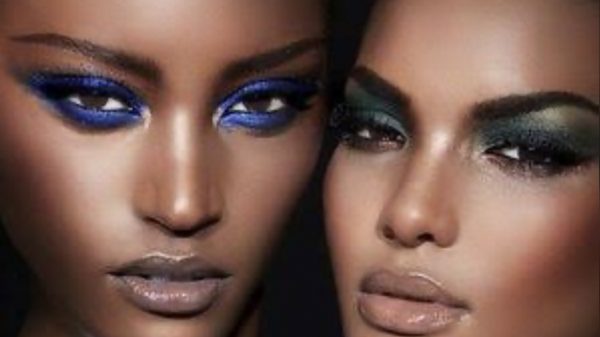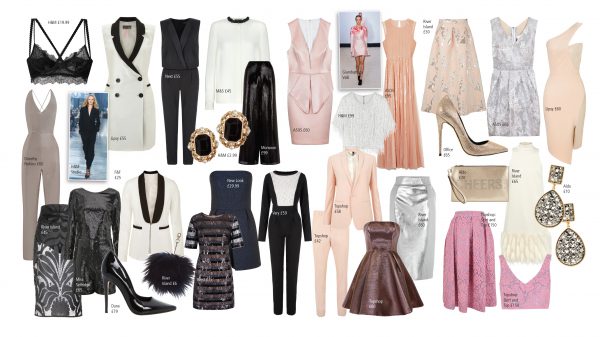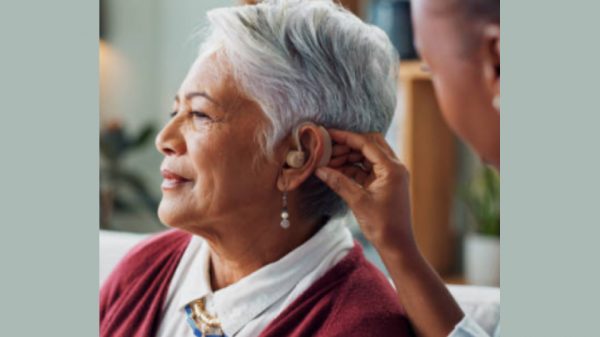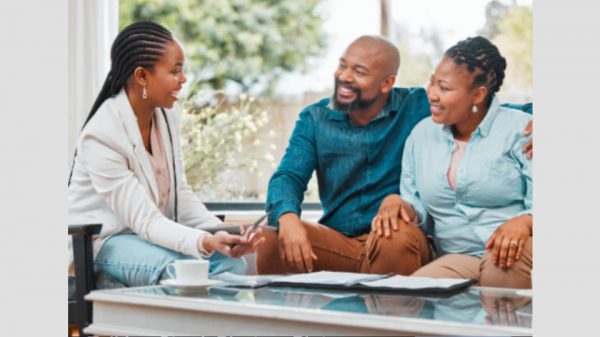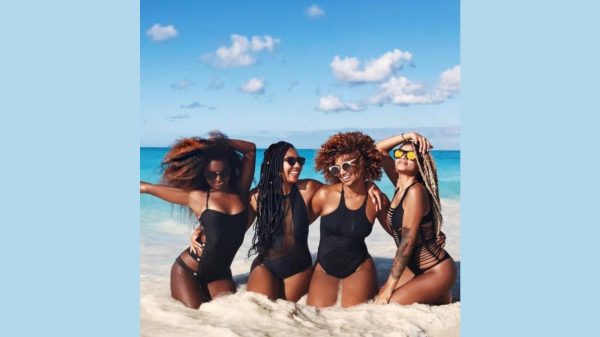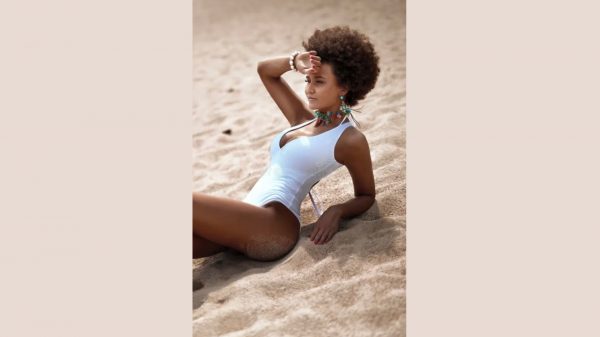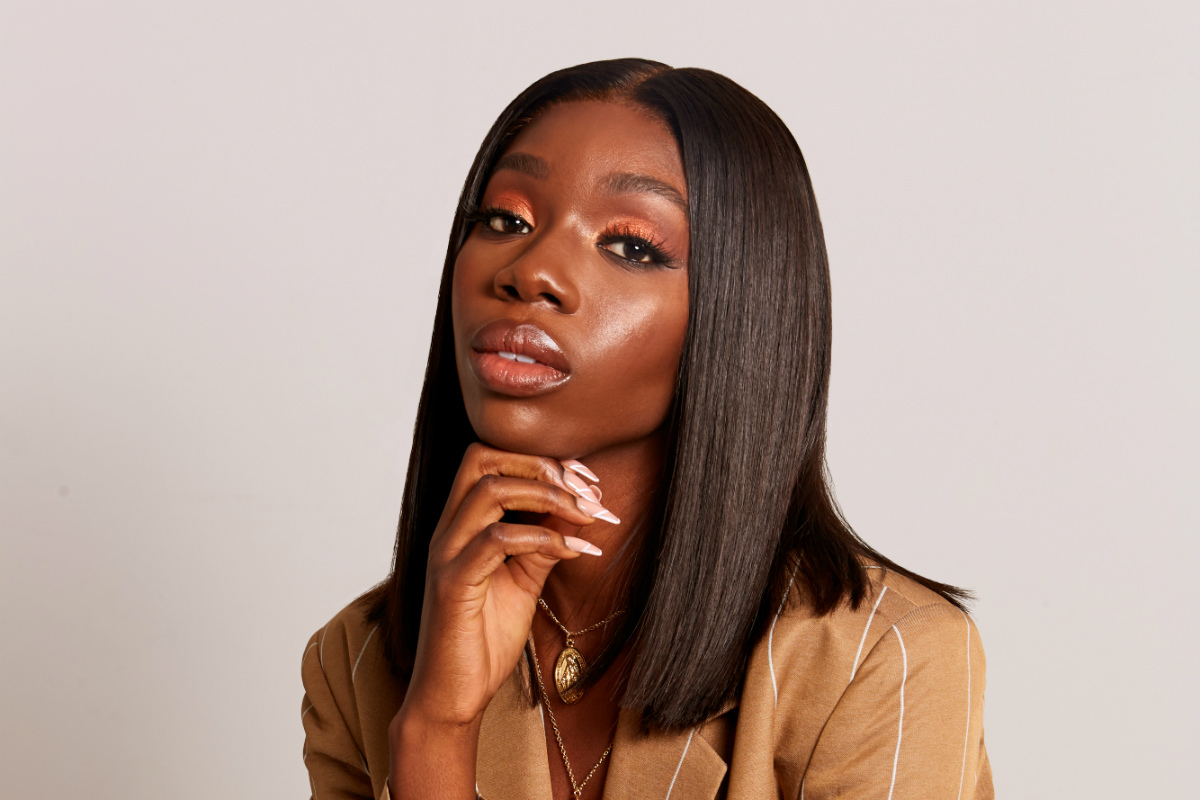Despite only being on screens for three and a half weeks, Yewande Biala’s presence on Love Island made her an adopted national treasure and won her plenty of fans. She tells Nicole Vassell about life outside of the villa, and her hopes for the future
Yewande Biala doesn’t like taking risks.
Sitting down for our interview at an unassuming fish and chips restaurant in south-west London, this is something I gather quickly. When I respond to her question about what a prawn cocktail is, she shakes her head in distaste and decides to just have a drink, rather than attempt to eat something she can’t guarantee she’ll enjoy. When the waiter comes over to take our order, she goes for a lemonade – opting for a name-branded variety, rather than the house specialty, it’s another immediate example of her affinity for safety.
You’d think that someone with such an appreciation for a sure bet would be the last person to put themselves forward for Love Island, the supremely popular dating contest that gives everyone who tries out a chance at winning £50,000, the love of the nation and a relationship.
Though the benefits are plentiful, being separated from the outside world for up to two months, with no idea of how your scenes are being edited, or how you’re being received by the public is enough to make most food for thought. However, the 23-year-old scientist from Dublin was keen for an extra injection of fun into her life; having spent much of her life with her nose dutifully in her books, it was time to let her hair down and get some life experience. So after weighing up the possible results, she accepted her place on the show, and off to Majorca she flew.
‘The way I look at things in life is like a risk assessment,’ she explains matter-of-factly. ‘I look at the pros and the cons; I assess the benefits of going on the show, and with that, the worst possible outcome – which could be that people hate me, or not ‘get’ me, and just want me off the show. But even if that happened, I’d still enjoy myself and have an amazing summer regardless.
‘It’s a once in a lifetime opportunity; I thought, if I turn this down I might not get something like this again, so I might as well go and see what happens.’
It’s fair to say that she made the right choice. What happened was that nearly immediately after entering, her calm, sweet and self-assured persona made her an early favourite with viewers. For many of the six nights per week that the reality show aired, ‘Yewande’ was often a trending word across the UK, with people discussing everything from her outfits, to her deadpan asides, to complaining if they felt she hadn’t received enough airtime that evening. Twitter display names such as ‘Yewande Stan’ and ‘Yewande’s Wig’ were borne out of appreciation, and anyone who threatened her happiness or criticised her in any way was subject to unbridled scorn.
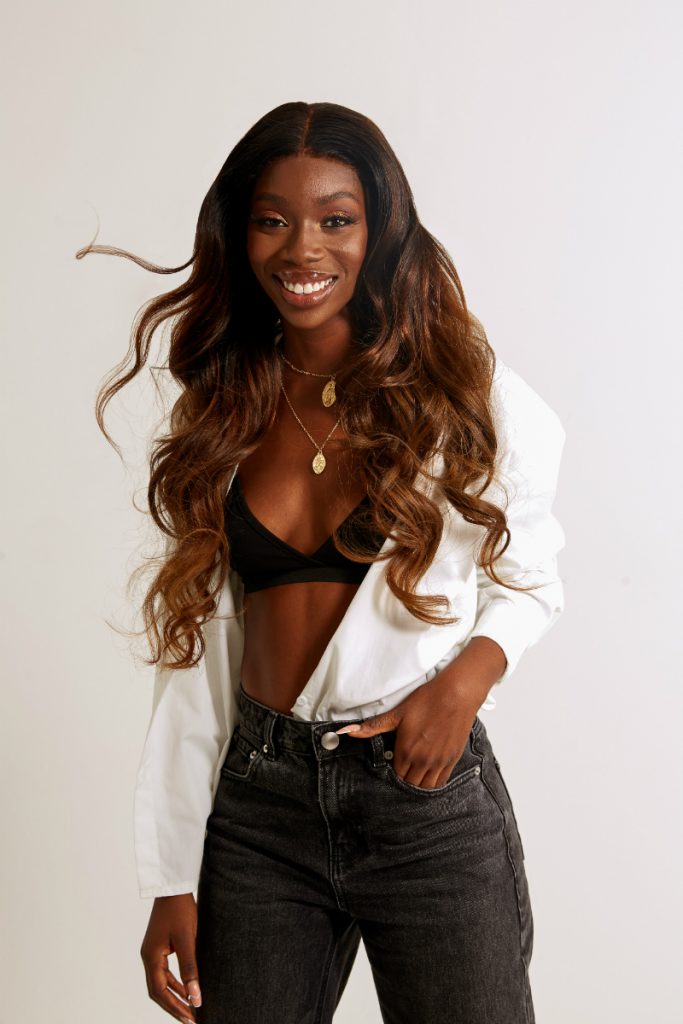
For anyone with a knowledge of how Black women have been received on Love Island and other reality programmes in the past, seeing the widespread praise for Yewande was a welcome change. Though some contrarian views are inevitable, and she received the typical, biased declarations of her being ‘bitter’, or ‘angry’, she was a much-loved member of the cast. When she was ‘dumped’ from the Island after three and a half weeks, viewers and Islanders alike were devastated – none more so than eventual winner Amber Gill, and pharmacist Anna Vakili. Together, the three women formed the strongest visible friendship of the series; with plans to move into their own London flat together, along with Anna’s sister Mandi, their bond is only strengthening after their time in Majorca. With Anna being of Iranian descent, and Amber being mixed-race, it was an informal union of women of colour. Was this an intentional alliance?
‘Not particularly,’ Yewande begins. ‘We just couldn’t find anyone for us, and everyone who came in was like, “My type is blonde and petite” – so then, Amber felt like she was the second choice. Like, if the blonde and petite girl didn’t work out, the next person was always Amber – so she struggled with that. And Anna was the same; she was like, “I’m always the third choice if the blondes don’t work out, then Amber doesn’t work out!” That was what bonded all of us together. I didn’t even make the list. I’m in the corner saying, “Oh, that’s lovely, oh you like Molly [Mae Hague, fellow contestant]? Cool, she’s great, yeah!” And that was literally it for me. So that definitely did bother us, because we struggled. The struggle was REAL.’
“I think it’s the Nigerian in me, not to show that much affection”
The embodiment of ‘brains and beauty’, one would imagine that Yewande would be a catch for a dating show. Yet, if you’re an experienced viewer of dating shows, or you’ve dated while being a Black woman in general, you’ll know that just because you’re perfectly desirable, there’s no guarantee that finding a match will be easy.
‘Even before I went in, I emotionally prepared myself in case I didn’t get picked, and how I’d deal with that,’ she admits. ‘It would have been very naive of me if I didn’t even consider the option that I’d struggle and wouldn’t get picked. Watching these shows, you do know that there’s always that one Black person, that one Black girl who struggles to find love.’
However, in the second week of the show, the struggle seemed over, as Danny Williams joined the cast and made an active effort to win Yewande’s attention and affection. For a short while, it seemed as if we’d finally get an example of a dark-skinned Black woman on a dating programme embarking on a successful, reciprocal romance. Yet, they had vastly different ideas of how to express interest in one another, and the cracks soon began to show.
‘I said to my friend, “I think it’s the Nigerian in me, not to show that much affection,”’ Yewande says wryly. ‘And it’s just the household I grew up in really – I hugged my sisters one time, and they literally were like, “Are you okay? What’s going on?”
‘That’s the type of person I am, so it’s harder in a relationship because it takes a long time to open up and be more affectionate. In the villa, everyone expects it to happen like that – but I didn’t want to force anything.’
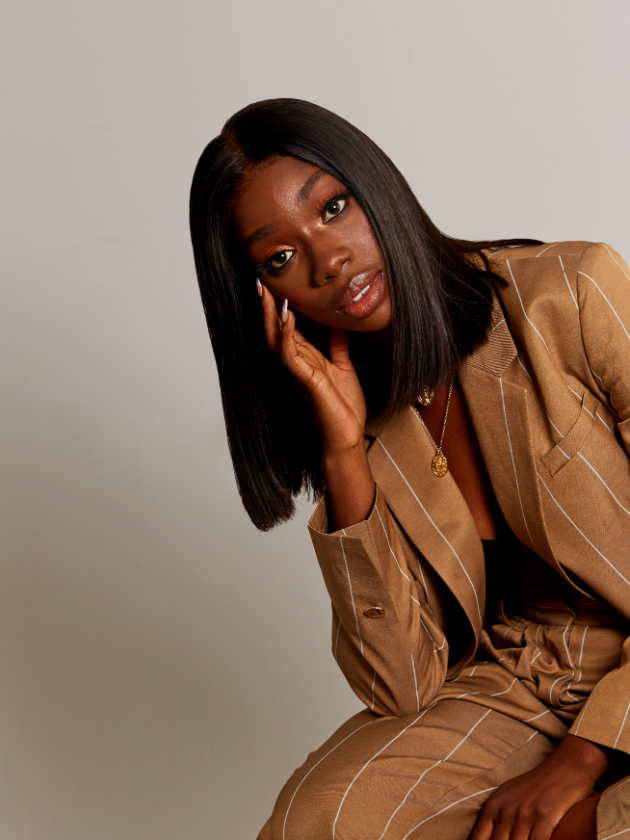
Eventually, Danny chose to couple up with Islander Arabella Chi, which resulted in Yewande’s emotional elimination from the programme. Being blonde-haired, blue-eyed and repeatedly praised by other contestants for her looks, Arabella was more closely fitting of the description of the ‘ideal’ woman that she, Amber and Anna had grown accustomed to hearing. But when I ask whether getting essentially swapped out for a woman of that description felt like salt in the wound, Yewande maintains that it wasn’t much of a factor in her disappointment:
‘That didn’t really cross my mind. A part of the hurt was him, and what he did – but it was more of an issue with me; I felt like all my relationships had ended just like this, and I don’t know why. So it wasn’t him leaving me for a blonde that hurt – it was more me not understanding why this happened again.’
However, she’s been refreshingly vocal about matters of representation, race, as well as colourism since her departure from the competition in late June. With this being the most diverse cast of Love Island’s five series yet, this is the first time that there’s a real opportunity for these conversations to come from an Islander, and to explore how that had an effect on her experience on the show. In a Radio 1 interview with Reece Parkinson in August, Yewande spoke frankly about the dynamics of Black men and women in the dating sphere, and mentioned her judgement that upon meeting castmate Sherif Lanre, she ‘knew’ that he wouldn’t be interested in dating her, and would instead prefer Amber, since she has lighter skin.
“I got so many comments saying, ‘Yewande doesn’t date Black men’ – where the hell have you gotten that from?”
Though Yewande swears by not reading any headlines, or online discussions about herself (‘If it’s an interview I’ve done, I know what I said – and if it’s a rumour, or something I haven’t done, I don’t need to know – there’s nothing I can do about it, it’s already out’) she couldn’t avoid the shockwaves that these remarks caused on social media. While some commended her for telling the truth about how many dark-skinned women feel when pursuing romance, others criticised her making an assumption of Sherif before knowing him. On the polarising reaction her words caused, Yewande tells me that she now knows that this is a part of being a public figure.
‘People want you to talk about diversity and colourism – but the same people who’d say that I should use my platform for stuff like that might then turn around and say, “Why’s she doing that?” Out of that discussion with Reece, I got so many comments saying, “Yewande doesn’t date Black men” – where the hell have you gotten that from? I was like, what? I’m sorry, when I was shouting “Ovie, Ovie, Ovie”, did you not get that? People want me to talk about these issues, but they also might crucify you for not doing it the way they want. You can’t please everyone.’
To make it clear for anyone asking, then: does she have a preference, when it comes to dating? ‘Not really,’ she shrugs. ‘I think I’m open, really. I’ve dated more Black men than I have white men, so I don’t know where they’re getting this from. Absolutely ridiculous.’
And when it comes to new romance, it seems the search continues – the heightened attention that participating in the show has had on her life has been more of a hindrance to a successful partnership, than a help.
‘I went into a dating show to find love, and came out more single than what I was when I went in,’ she laughs incredulously. ‘I don’t understand how that makes sense! Now, I feel like it’s harder to find someone. First, I probably won’t see the message if someone DM’s [direct messages] me, because I have so many coming in; and secondly, when you do hear from someone, you don’t really know who to trust. Everyone’s clout chasing.’
Telling an example of someone using her ‘for clout’ – for social relevance and popularity – she continues: ‘I went to dinner with some Instagram girl, because I wanted to mingle with people in the media. I came out and there were paps everywhere. She’d tipped them off. And I was like… Okay. You don’t really know who to talk to. You don’t know who likes you for you, or if they’re talking to you because you were on Love Island.
‘That’s why I understand Love Island people sticking with other Love Island people. If you look at it, they all tend to date each other – I thought it was weird before. But it’s either that, or go with celebs, or your ex or something because you know that he likes you, because he liked you before!’
Days after our interview, she posted what seemed to many as evidence of a date night with Love Island 2019 alumnus George Rains. Though neither of them have commented on the nature of their relationship at the time of writing, it hasn’t stopped fan chatter about a potential romance. Though a downside to fame is the fact that her personal life will be a topic of public interest for the foreseeable future, the doors that this has opened are a benefit. Though she has no plans to abandon her career in biotechnology, Yewande is embracing all the options that are being sent her way: ‘I want to go into science, fitness, loads of things – but it’s all in the pipeline. You just have to be patient.’
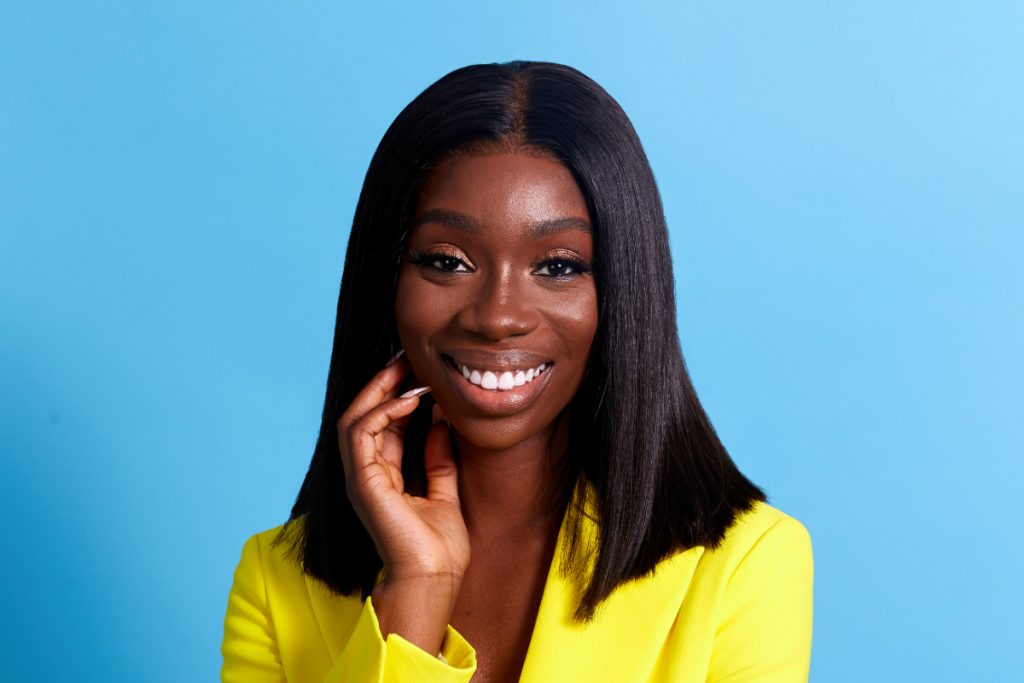
Often, the argument is made that Love Island and shows of this nature just aren’t for Black women; viewers feel triggered by seeing women who look like them face rejection, or being ignored for consideration as a viable candidate. However, seeing Amber win the programme with partner Greg O’Shea, some Black viewers felt a sense of victory. With Amber being mixed-race and lighter-skinned, there is still a conversation to be had when it comes to preference and skin tones – yet, seeing her be able to be herself and come out successful, there’s a glint of optimism for the future.
‘I feel like you have to break this stigma of reality TV not being a place for Black women,’ Yewande says when I ask her if she’d recommend other Black women to apply for the show. ‘I wasn’t in Love Island for that long, but if I was, I feel I could have found someone that I connected with. So, I would encourage more Black women to go on – more Black people need to be seen on TV in general.
‘I’ve been getting a lot of messages from Black women asking whether they should try out for the next series – 100%. Go for it. How amazing would that be, if another Black woman went on and broke that stigma, and actually found someone she connected with? If I didn’t do it, maybe you can. Someone came in for me – even though it ended terribly, it was a step closer. So maybe the next person can win? We have to keep trying ‘til we break the pattern, really.’
Before we finish our chat, I ask Yewande whether she has a message specifically for those who are rooting for her success – particularly the Black women who have had her back from the time her contestant profile hit the internet, weeks before the show began airing.
‘First, thanks for the support,’ she starts, before pausing to think. ‘I hope I’m doing a good job. I hope I’m representing the way you want me to. And I hope I’m a good role model.’
From seeing how she has conducted herself so far, it seems she has nothing to worry about – she’s doing just fine.






